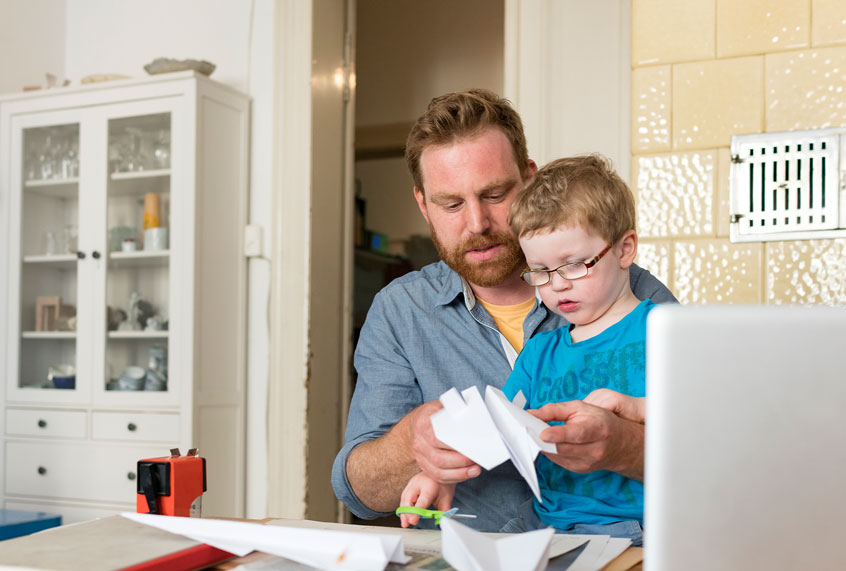In the mid-1970s, I was a young assistant professor in counseling psychology at Boston University, who held himself out to the world as an expert in the family. I taught the doctoral course sequence in family psychology and conducted research on prevention-oriented programs for parents. During this time, I was also struggling on a personal level with the role of a divorced, semi-custodial father. I visited my daughter in NYC on the weekends, and she lived with me during the summers.
These extended 12-week visits with my daughter did not go smoothly. I was not adept at understanding her needs nor in managing her behavior. For what seemed like the longest time I lived with a sense of fraudulence. My inner thoughts at the time went something like this; “Who do you think you are, pretending to be an expert on parenting, when you are struggling in your own life as father?” The shame I felt about my role as a father was intensified because of my unresolved feelings about my own father. Not yet having had the experience of exonerating him for the ways that I felt he failed me, I was unremittingly hard on myself for the ways that I felt that I was failing my daughter. And like most men, I kept my sense of inadequacy to myself and did not share it with anyone, for fear of violating the male code of self-reliance and invulnerability.
In the late 1970’s, I saw the film “Kramer vs. Kramer,” which resulted in a major epiphany in my life. I saw myself in the Mr. Kramer character portrayed by Dustin Hoffman, and instead of continuing to think I was just a struggling father and all the other guys were doing fine, I began to wonder if this wasn’t more of a broader phenomenon affecting many fathers. My interests then turned from the family to fathering and the role of men in families — particularly how fathers raise their sons.
While COVID-19 has brought great strain and suffering to families in the United States and around the world, one positive development has been the change in the father’s role in the family. As quickly as modern life came to a halt, fathers immediately came into much closer contact with their families on a day to day basis. An article in an Australian newspaper points out that for many professional men, work from home orders have resulted in “Fathers and mothers everywhere … juggling work routines with child care, home schooling sessions and domestic chores during the coronavirus lockdown.”
While this is certainly a positive development in many cases, it may not be in all cases, raising the question of how fathers interact with their children. When it comes to raising boys, fathers have traditionally been regarded as playing a key role in the development of their son’s masculinity. Termed the “essential father hypothesis,” this perspective, based on psychoanalytic theory, asserts that fathers have an essential role in modeling, promoting, and demanding masculinity and heterosexuality for their sons. These messages endorsing masculinity have significant implications for the psychosocial development and wellbeing of young men, and such early masculine socialization is linked with a number of negative outcomes, including stress, anxiety, decreased life satisfaction, lowered self-esteem, depression, aggression and violence. Adherence to masculinity expectations is problematic for men, for those close to them, and for society at large.
Instead of socializing their sons to conform to masculine norms, I encourage dads to develop instead an involved (or hands-on) fathering role. Such a role would mean doing some of the direct caregiving work that is more often done by mothers. For example, dad could get the kids dressed and fed and ready for day care or school in the morning. Or he could pick them up in the afternoon and get dinner started and the kids settled into their homework or evening routines. Such a role can begin early in the child’s infancy and is often facilitated by taking paternity leave which helps fathers to bond with their child. Recent studies have suggested that bottle feeding may be an especially good way for fathers to form a close relationship with their child.
These gestures and actions can go further than we might imagine in bringing positive change – while most boys and men are not violent, the truth is that perpetrators of violence are overwhelmingly male and such violence is linked with masculinity. Recent research shows that fathers are an important source of masculine socialization for their sons. For example, one study found that when examining the talk of mothers and fathers of 2- to 4- year old children, fathers conveyed more gender-stereotyped messages. In a more explicit example, researchers found that fathers provided less praise to their sons when they perceived their sons as acting in a ‘feminine’ manner. In line with this finding, another study found that college men recalled more instances of father’s telling them to act tough as compared to college women.
As a result, there’s a connection between masculinity and the present moment that must be explored – many of the recent activist movements, such as #MeToo, #MarchForOurLives and #BlackLivesMatter – are responding to many important issues and the negative impacts of masculinity on our culture is one of them. Leading boys to conform to the norms of masculinity
is at the root of it and as fathers spend more time with their sons, not only on Father’s Day but everyday – there’s a chance to change course.

